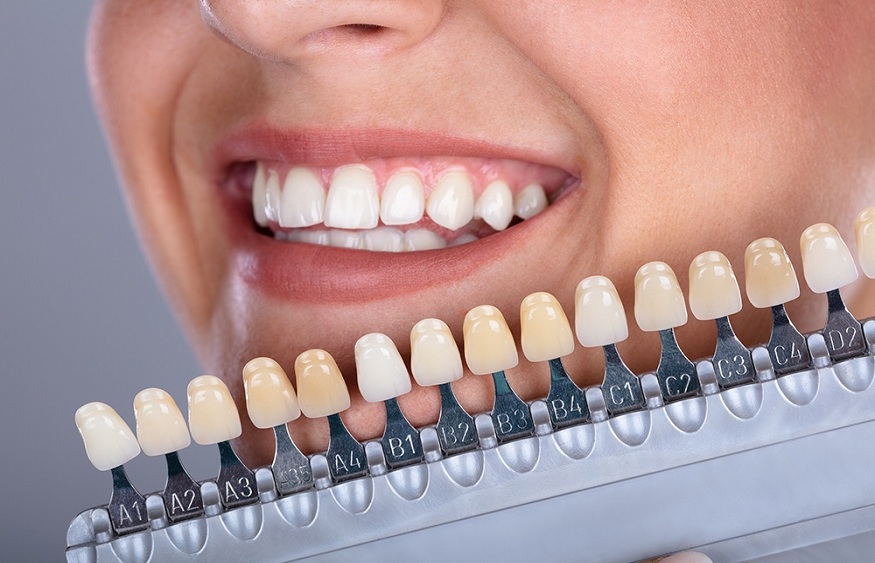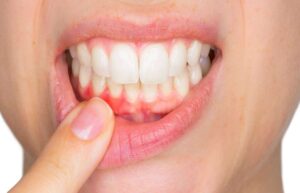If you’re considering teeth whitening to brighten your smile, but have sensitive teeth, you may be wondering if it’s safe to proceed. Our trusted cosmetic dentist in Dallas, TX, understands the concerns of patients with sensitive teeth. Teeth whitening, whether done professionally or at home, can potentially irritate sensitive teeth, making it essential to weigh the risks and benefits. However, with advancements in dental technology and gentle whitening options, achieving a radiant smile without exacerbating sensitivity is now more accessible.
In this article, we’ll delve into the impact of teeth whitening on sensitive teeth, exploring the risks, benefits, and precautions to consider.
Understanding Sensitive Teeth
Sensitive teeth, also known as dentin hypersensitivity, refer to a common dental condition characterized by discomfort or pain in response to various stimuli, such as temperature changes, sweet or sour tastes, or pressure. This sensitivity occurs when the dentin, the layer beneath the tooth enamel, becomes exposed, allowing hot, cold, sweet, or sour substances to reach the pulp, which contains nerve endings. As a result, individuals with sensitive teeth may experience sharp, stabbing pain or discomfort when consuming certain foods and drinks, brushing their teeth, or experiencing temperature fluctuations.
According to the American Dental Association (ADA), sensitive teeth affect approximately 40 million Americans, with causes ranging from tooth decay and gum recession to aggressive tooth brushing and dental work.
Teeth Whitening and Sensitive Teeth: The Connection
Teeth whitening and sensitive teeth have a complex relationship. Understanding this connection is crucial for individuals with sensitive teeth who desire a brighter smile.
How Teeth Whitening Affects Sensitive Teeth
- Increased Dentin Permeability: Whitening agents penetrate the enamel, reaching the dentin and potentially increasing sensitivity.
- Nerve Endings Exposure: Hydrogen peroxide and carbamide peroxide can irritate nerve endings, exacerbating sensitivity.
- Pulp Inflammation: Whitening agents can cause pulp inflammation, leading to increased sensitivity.
Factors Contributing to Sensitivity During Teeth Whitening
- The concentration of Whitening Agents: Higher concentrations increase sensitivity to risk.
- Duration of Treatment: Longer treatment times increase exposure to whitening agents.
- Type of Whitening Product: Professional, at-home, or DIY whitening products vary in sensitivity risk.
- Individual Tooth Structure: Thinner enamel or existing dental work can increase sensitivity.
Reducing Sensitivity During Teeth Whitening
- Consult a Dentist: Professional guidance ensures safe and effective whitening.
- Desensitizing Toothpaste: Pre-whitening use can reduce sensitivity.
- Gentle Whitening Products: Choose products specifically designed for sensitive teeth.
- Custom-Fit Trays: Professional-fit trays minimize whitening agent exposure.
Best Teeth Whitening Options for Sensitive Teeth
- In-Office Whitening: Dentist-supervised whitening with desensitizing agents.
- At-Home Whitening Kits: Gentle, dentist-recommended products.
- Laser Whitening: Controlled, minimally invasive whitening.
Benefits of Teeth Whitening for Sensitive Teeth
While sensitive teeth require caution during teeth whitening, the benefits can be substantial:
Cosmetic Benefits
- Improved Appearance: Whiter teeth enhance smile confidence.
- Boosted Self-Esteem: A brighter smile can transform overall self-perception.
- Youthful Appearance: Whiter teeth can make teeth appear more youthful.
Oral Health Benefits
- Removal of Surface Stains: Whitening removes plaque and bacteria.
- Gum Health Improvement: Whitening can help reduce gum inflammation.
- Fresh Breath: Whitening can leave the mouth feeling clean and fresh.
Confidence and Social Benefits
- Enhanced Social Confidence: A brighter smile can improve social interactions.
- Professional Advantages: A whiter smile can make a positive impression.
- Increased Happiness: A brighter smile can boost overall happiness.
Dental Health Benefits
- Early Stain Detection: Whitening reveals underlying stains, aiding early detection.
- Prevention of Further Discoloration: Whitening can prevent future stains.
- Improved Oral Hygiene: Whitening encourages regular dental care.
Sensitive Teeth-Specific Benefits
- Desensitizing Ingredients: Some whitening products contain desensitizing agents.
- Gentle Whitening Options: Professional and at-home options cater to sensitive teeth.
- Customized Treatment: Dentists can tailor whitening treatment for sensitive teeth.
Takeaway
Teeth whitening can be a viable option for individuals with sensitive teeth, but caution is essential. By understanding the risks and benefits, taking precautions, and choosing gentle products or professional options, individuals can achieve a brighter smile while minimizing sensitivity.



